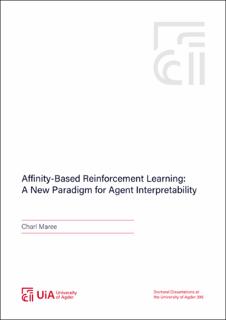Affinity-Based Reinforcement Learning : A New Paradigm for Agent Interpretability
Doctoral thesis
Published version

Permanent lenke
https://hdl.handle.net/11250/3046928Utgivelsesdato
2023Metadata
Vis full innførselSamlinger
Originalversjon
Maree, C. (2023). Affinity-Based Reinforcement Learning : A New Paradigm for Agent Interpretability [Doctoral dissertation]. University of Agder.Sammendrag
The steady increase in complexity of reinforcement learning (RL) algorithms is accompanied by a corresponding increase in opacity that obfuscates insights into their devised strategies. Methods in explainable artificial intelligence seek to mitigate this opacity by either creating transparent algorithms or extracting explanations post hoc. A third category exists that allows the developer to affect what agents learn: constrained RL has been used in safety-critical applications and prohibits agents from visiting certain states; preference-based RL agents have been used in robotics applications and learn state-action preferences instead of traditional reward functions. We propose a new affinity-based RL paradigm in which agents learn strategies that are partially decoupled from reward functions. Unlike entropy regularisation, we regularise the objective function with a distinct action distribution that represents a desired behaviour; we encourage the agent to act according to a prior while learning to maximise rewards. The result is an inherently interpretable agent that solves problems with an intrinsic affinity for certain actions. We demonstrate the utility of our method in a financial application: we learn continuous time-variant compositions of prototypical policies, each interpretable by its action affinities, that are globally interpretable according to customers’ financial personalities.
Our method combines advantages from both constrained RL and preferencebased RL: it retains the reward function but generalises the policy to match a defined behaviour, thus avoiding problems such as reward shaping and hacking. Unlike Boolean task composition, our method is a fuzzy superposition of different prototypical strategies to arrive at a more complex, yet interpretable, strategy.
Består av
Paper I: Maree, C., Modal J. E. & Omlin, C. W. (2020). Towards Responsible AI for Financial Transactions. In C. A. Coello (Ed.), IEEE Symposium Series on Computational Intelligence (pp. 16–21). IEEE. https://doi.org/10.1109/SSCI47803.2020.9308456. Accepted version. Full-text is available in AURA as a separate file: https://hdl.handle.net/11250/3046856.Paper II: Maree, C. & Omlin, C. W. P. (2021). Clustering in Recurrent Neural Networks for Micro-Segmentation using Spending Personality. In P. Haddow (Ed.), IEEE Symposium Series on Computational Intelligence. IEEE. https://doi.org/10.1109/SSCI50451.2021.9659905. Published version. Full-text is available in AURA as a separate file: https://hdl.handle.net/11250/3046894.
Paper III: Maree, C. & Omlin, C. W. P. (2022). Understanding Spending Behavior: Recurrent Neural Network Explanation and Interpretation. IEEE Symposium on Computational Intelligence for Financial Engineering and Economics. https://doi.org/10.1109/CIFEr52523.2022.9776210. Accepted version. Full-text is available in AURA as a separate file: .
Paper IV: Maree, C. & Omlin, C. W. P. (2022). Balancing Profit, Risk, and Sustainability for Portfolio Management. IEEE Symposium on Computational Intelligence for Financial Engineering and Economics. https://doi.org/10.1109/CIFEr52523.2022.9776048. Accepted version. Full-text is available in AURA as a separate file: .
Paper V: Maree, C. & Omlin, C. W. P. (2022). Reinforcement Learning Your Way: Agent Characterization through Policy Regularization. AI, 3(2), 250-259. https://doi.org/10.3390/ai3020015. Published version. Full-text is available in AURA as a separate file: https://hdl.handle.net/11250/3046910.
Paper VI: Maree, C. & Omlin, C. W. P. (2022). Can Interpretable Reinforcement Learning Manage Prosperity Your Way? AI, 3(2), 526-537. https://doi.org/10.3390/ai3020030. Published version. Full-text is available in AURA as a separate file: https://hdl.handle.net/11250/3001459.
Paper VII: Maree, C. & Omlin, C. W. P. (2022). Reinforcement learning with intrinsic affinity for personalized prosperity management. Digit Finance, 4, 241–262. https://doi.org/10.1007/s42521-022-00068-4. Published version. Full-text is available in AURA as a separate file: https://hdl.handle.net/11250/3046916.
Paper VIII: Maree, C. & Omlin, C. W. P. (Forthcoming). Symbolic Explanation of Affinity-Based Reinforcement Learning Agents with Markov Models. Expert Systems with Applications. https://doi.org/10.48550/arXiv.2208.12627. Submitted version. Full-text is available in AURA as a separate file.
Paper IX: Vishwanath, A., Bøhn, E. D., Granmo, O.-C., Maree, C. & Omlin, C. W. P. (2022). Towards artificial virtuous agents : games, dilemmas and machine learning. AI and Ethics. https://doi.org/10.1007/s43681-022-00251-8. Published version. Full-text is not available in AURA as a separate file.
